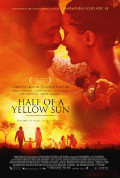
Directed by
Biyi Bandele
111 minutes
Rated MA
Reviewed by
Bernard Hemingway

Half Of A Yellow Sun
Synopsis: The lives of four people (Chiwetel Ejiofor, Thandie Newton, Joseph Mawle abd Anika Noni Rose during the struggle to establish an independent republic of Biafra in the late 1960s.
The title of this film is a reference to the half yellow sun at the centre of the flag of the short-lived Republic of Biafra. Synonymous in the West with the idea of famine, Biafra was a secessionist state in south-eastern Nigeria that was created in May 1967, and that after two-and-a-half years of war, in which some 1 million civilians died, was reintegrated into Nigeria in January 1970.
This is the backdrop for the story of wealthy Nigerian twin sisters Olanna (Thandie Newton) and Kainene (Anika Noni Rose) and the divergent paths their lives take in post-colonial Nigeria, in particular their choice of partners. Olanna is in love with Odenigbo (Chiwetel Ejiofor) a so-called "revolutionary" whilst her more materialistic sister teams up with a white writer, Richard (Joseph Mawle).
Adapted from an acclaimed novel by Chimamanda Ngozi Adichie and a debut feature from playwright turned writer-director, Biyi Bandele, Half Of A Yellow Sun is an at-times intensely moving film that struggles to balance the background political history with the foreground relationship drama, never an easy task. Using archival newsreel footage, aided by an occasional voice-over and superimposed maps Bandele tries to give us the broad strokes of the Biafran tragedy but particularly given its remoteness from our general awareness, one must work to piece together the elements which appear to be yet another of the tribally-based conflicts that have torn apart so much of post-colonial Africa.
This broadness spills over to the handling of the foreground drama particularly with the relationship between Olanna and Odenigbo being too schematically-portrayed although Newton and Ejiofor bring a good degree of compassion to their characters. This under-developed sense of motivation is even more apparent in the case of Kainene and Richard, whose relationship appears out of nowhere and receives little attention. In addition Bandele’s at-times awkward dialogue has an estranging effect.
Whilst evidently the budget for this film was small, the production design is very nicely retro '60s and the re-creation of the war zone effective (including shockingly believable massacre scenes). Of the famine there are only tangential references. Despite a tendency to the generic Bandele manages to convey a sense of the tragedy through which his characters lived and opens a window on a largely forgotten in the West chapter of modern African history.
Want something different?





